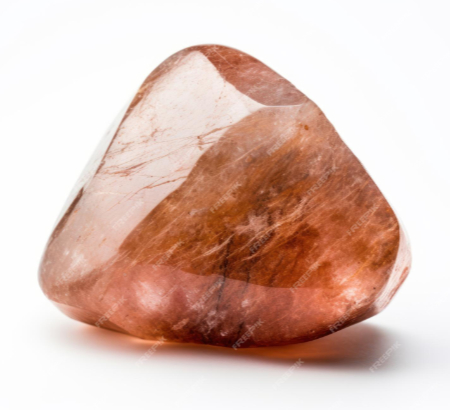
Sunstone is a microcline or oligoclase feldspar, which when viewed from certain directions exhibits a spangled appearance. It has been found in Southern Norway, Sweden, and various United States localities. Sunstone has also been found on some beaches along the midcoast of South Australia.

The optical effect is due to reflections from inclusions of red copper, hematite, or goethite, in the form of minute scales, which are hexagonal, rhombic, or irregular in shape, and are disposed parallel to the principal cleavage-plane. These inclusions give the stone an appearance something like that of aventurine, hence sunstone is known also as “aventurine-feldspar”. The optical effect is called schiller and the color of Oregon Sunstone is due to copper. The middle part of this crystal sparkles, and usually the color is darkest in the middle and becomes lighter toward the outer edges.
The feldspar which usually displays the aventurine appearance is oligoclase, though the effect is sometimes seen in orthoclase: hence two kinds of sunstone are distinguished as “oligoclase sunstone” and “orthoclase sunstone”. (1)

Cabochons from Norwegian and Indian material may reach 100 carats or more. Most available material cuts smaller stones.. This is because the rough is usually badly shattered and cracked. (2)
Sources
(1) Wikipedia
(2) International Gem Society
(3) Freepik
In My Shop
Orange Moonlight Necklace
This Orange Moonlight Necklace is composed of Orange Moonlight Sunstone Beads, Polka Dot Lampwork Beads and gold plated necklace components including a toggle clasp
1 in stock


